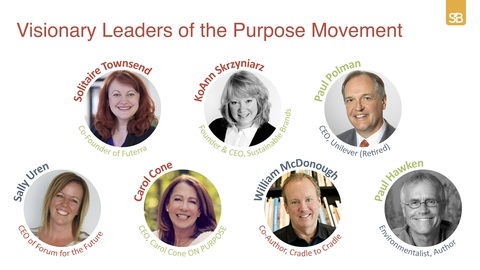- blog
- Business
Nearly thirty years ago, asking business leaders about the purpose of their business would merit a nearly universal response: profit.
How far we’ve come.
Earlier this month at Sustainable Brands’ global flagship conference, some of the world’s biggest companies rewrote the rules of business, launching Brands for Good. As one of the pioneers of the field of corporate social responsibility and social purpose, this is like winning the Super Bowl, Kentucky Derby, and Indy 500 at the same time.
Brands for Good is a movement to make sustainable living easier and more rewarding around the world. Founding partner brands pledge to embed social purpose at the heart of their companies, products and experiences; use marketing, communications, and brand influence to make sustainable living accessible, aspirational, and rewarding; and work together to transform the field of marketing to shift behaviors and drive positive impact. The first step in building this movement is the development of a Lifestyle Transformation Roadmap, which will identify high-impact sustainable “behaviors,” linked to guidance, tools, and resources to inform the public about how they can make more sustainable lifestyle choices. Companies can utilize this information to guide their own decision-making, product and service development, hiring, communications, etc.
Founding partners include Dentsu Aegis Network, National Geographic, Nestlé Waters, PepsiCo, Procter & Gamble, SAP, SC Johnson, Target, and Visa. Beyond the size of these organizations, what’s astounding is the range of sectors they represent, from business and financial services to retail, food & beverage and communications. This proves what I’ve believed for those thirty years: that linking businesses with social issues gives companies a competitive edge, attracts talent, guides decision-making and long-term vision, supports financial performance, ignites product and service innovation, and builds meaningful connections with stakeholders.
The Brands For Good movement is a statement that purpose is here, and it’s imperative for business success. Today, 90 percent of consumers say companies and brands have a responsibility to take care of our planet and its people.
It’s important to recognize the individuals who have believed in, proved, and advanced the power of social purpose for business and social impact for decades. I am deeply honored to be named among this group, which has been relentless in pioneering the power of business to better communities, nations and the world. Others recognized for their remarkable contributions include:

Getting to this point has been a collaborative effort between business leaders, entrepreneurs, forward-thinking agencies and consultancies, researchers, thought leaders, and NGOs. But our journey is far from over. We’ll continue to work together—as individuals and through coalitions and movements like Brands for Good—to bring social purpose to the center of business.
Our future depends on it.